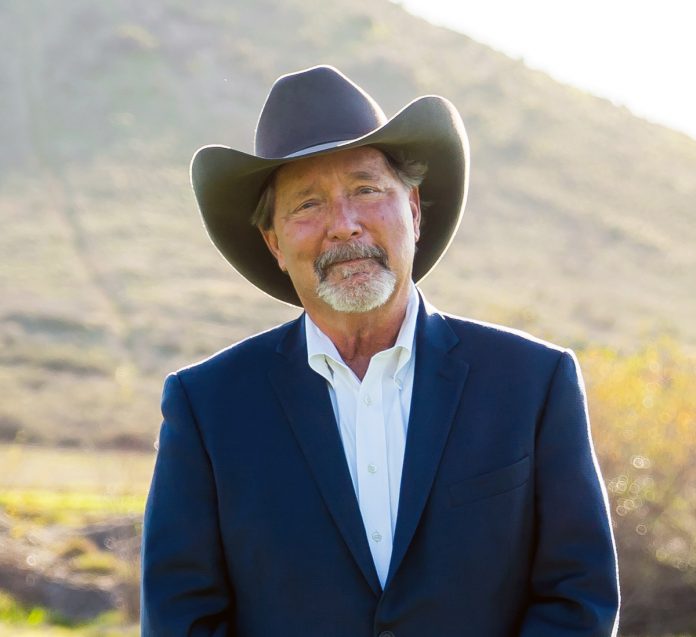Poway Mayor Steve Vaus’ family has been in East County for three generations. He said his parents moved from Los Angeles 50 years ago and purchased a home in El Cajon in 1973 and opened it as a Christian residential facility for troubled teens.
Vaus and his wife have lived in East County since 1993 and raised their two children there. Vaus has lived in Poway for 27 years, has served as mayor for six years and served two years on City Council.
The 68-year-old Republican is running for San Diego County Supervisor District 2.
He said his track record as mayor uniquely qualifies him for the person to help East County thrive.
Vaus is endorsed by outgoing Supervisor Dianne Jacob.
Poway was the only San Diego County city ranking 18th, in the annual list of California’s safest cities based on FBI crime data and population statistics in 2018.
It has ranked in the top 50 in the past five consecutive years.
In 2019 19-year-old John T. Earnest was accused of opening fire with an AR-15 style rifle inside a Poway synagogue killing one woman and injuring three others, including the rabbi of the congregation.
Earnest is also accused of setting the Islamic Center of Escondido on fire. His court trial was supposed to begin in June but was delayed until at least March 2021 due to the COVID-19 pandemic.
“As any city would be, we were stunned,” he said. “First, we worked closely with local law enforcement and the FBI to provide additional security to other houses of worship. Then we began the mourning and healing process with the congregants of Chabad of Poway. As mayor I tried to be a calming and caring presence. Months later I was humbled to receive an award from the Anti-Defamation League, ‘For going above and beyond the call of duty in confronting hate.’”
In addition to Poway’s low crime rate Vaus cites the city’s development projects as successes.
“My city is the safest city in the county,” he said. “Ranked number one to raise a family. We have the best roads, balanced budgets, paid down pension obligations. Right now, we are revitalizing our town center with new homes, restaurants, shops. We are just now finishing an $11 million senior and community center. And we are paying cash.”
Vaus said Poway has 20 parks and about 65 miles of trails and is the envy of the county.
He said they are putting the finishing touches on county’s very first affordable housing project for developmentally disabled adults. They are also breaking ground on affordable housing for senior veterans.
“In the past 2.5 years, we expanded our open space by about 500 acres,” he said. “We get things done and I believe that they are the right things. All of this has come to pass on my watch as mayor. I think it is one heck of a blueprint to bring to the county.”
Late last year Poway residents were ordered to boil tap water before drinking it after residents started reporting discolored tap water.
“During an unprecedented storm event, a flap-gate into our clear-well became jammed with a piece of rope, allowing rainwater into the storage system,” said Vaus. “The result was cloudy water in a number of homes. Though every test by our Public Works Department showed our water to be safe for consumption and normal use, the state put a precautionary boil alert in place. Within hours of the state’s alert, the city set up two locations to distribute water to residents. I, along with other city council members, city staff and volunteers, worked from dawn until dusk loading cases of water into residents’ vehicles.”
Vaus said with COVID-19, he thinks congregated care facilities should have been “bubble wrapped” more quickly as it was clear from the beginning that the elderly is particularly vulnerable. He said the same goes for the Latino population and other communities of color.
“Over 60% of positive tests and 48% of deaths have been Latino,” he said. “Yet they only represent 33% of the population. That’s due to a few factors. Density of population, frequency of border crossings, but mostly because they are often our front-line workers. They have been on the job non-stop due to the pandemic.”
He said county social worker Ronda Felder is a sad example of this, who died battling COVID-19 on Aug. 3.
“Her commitment to her job investigating child abuse, cost her, her life,” he said.
Vaus said many things should have happened faster. Testing, quicker results, more PPE for care facilities, front-line workers and recognition of vulnerable populations.
“In general, I am disappointed the County has not provided more information,” he said. “I am not at pleased with the lack of details on outbreaks. If the County has the information and details that might be helpful to the public, they should share it. Other jurisdictions have done that, and we should too. We can’t keep the public in the dark.”
He said though things could have been done better, he is thankful that local hospitals were not overrun, ICUs maintained capacity, and there are plenty of ventilators. “It could have been much, much worse. Though, it is certainly not over yet,” he said.
Vaus said under his direction, Poway was the first jurisdiction to offer loan assistance to businesses, it set aside $2 million in reserves, and while walking through a park one day came up with the idea of picnic tables. He said the city purchased then provided 25-35 businesses the use of the tables for free so restaurants and other businesses could move outside.
“When the pandemic is over, we will take those picnic tables and re-purpose them in our parks. It is a win-win,” he said.
Vaus said his Sharing Outdoor Spaces opened the parks for free made it possible for workout, worship and other appropriate businesses to operate when people were extremely limited on working indoors. He said San Diego Mayor Kevin Faulconer followed suit. He said the City set aside some funding and has paid for 9,269 meals for vulnerable seniors.
“We have tried to balance the need for safety and security and at the same time help to lift up our businesses so they can survive this,” he said.
Vaus said for businesses to survive and rebuild that he wants government out of the way, let entrepreneurs to their jobs with minimal governmental influence or impact. He said too often, government creates more problems.
“We need to let communities be what they want to be,” he said. “We need to be ready to provide the infrastructure that they desire and make sure that we keep the commitments of the past.”
Vaus said our highways have been neglected with the State Route 94/Highway 123 interchange promised decades ago and competed years ago. He said he led a coalition at SANDAG for $9 million dedicated to that project and also projects on Highway 67 and Highway 52. He said he is determined to see those projects through.
Vaus said the Bradley Avenue offramp to Highway 67 project was dismantled by Sacramento politicians, missing a great opportunity to expand economic vitality around Gillespie field. He said that infrastructure is necessary.
“Gillespie Field has two business parts that provide more than 3,000 jobs and $110 annual impact to the local economy,” he said. “Gillespie relies on that Bradley/67 project. Without it the County cannot compete the 70-acre Cajon Center project. That is a $5 million project that will bring aviation jobs to Gillespie and have a big economic impact. The failure of the state over the past 10 years really shows how government can stifle development.”
Vaus said East County has many opportunities with its available land, successful businesses of many industries, room for housing growth and an instilled workforce.
“There is an opportunity to expand Lakeside, Spring Valley, Ramona, Alpine, but we cannot think small and we cannot think alone in a silo,” he said.
Vaus said the County needs to implement a redevelopment office, changing the culture of Planning and Development Services and make the county more business friendly. He said he has spoken to many people about their frustrations when they have to deal with the County.
“It can be fixed, but we cannot only focus on the unincorporated area. Jobs, infrastructure, housing and planning generally cross jurisdictional lines,” he said. “We have a shared responsibility to focus on the economic health of all of East County.”
Vaus said East County is “blessed” when it comes to the fire agencies combatting fires in East County. He said the Valley Fire showed how much progress the county has made in fighting wildfires more effectively.
“For decades, the answer from the County to back country folks was that they were on their own,” he said. “But the Cedar Fire changed everything. It went from the back country to the city. What we experienced in 2003 cannot be repeated. I will stand with our firefighters to make sure that they have the tools that they need. Fires in East County come with unique challenges, because of the livestock. At times like this East County comes together as family and takes care of each other, showing its best colors.”
Vaus said homelessness is personal to him. As a teenager, his older sister was diagnosed with severe schizophrenia and lived a “rough and tumble life,” on the streets of New York City at times.
“There just wasn’t a safety net there for her,” he said. “We have a moral responsibility to help folks like that. Homelessness doesn’t respect city boundaries. We need to treat it that way. There are a lot of people that just talk about homelessness.”
Vaus said a few weeks ago residents were cleaning up Lamar Park, which they have done multiple times, but for a long time, encampments kept coming back because there was nowhere to go. He said the County’s outreach got more than 300 homeless in the unincorporated area into a County funded motel room. He said as long as there are still homeless in the streets and riverbeds, there is more to do. He said the former county assessor building in El Cajon might be good for short-term senior housing. He said the County needs to look at old motels, industrial parties to purchase.
“It is a three-part problem we need to solve,” he said. “Housing for now, the emergency, get them off of the street. We need transitional purposes after that, and then, the long-term need. A tent or a tarp is not a home. In each of those circumstances that housing has to come with mental health and addiction treatment services. We have to treat the entirety of each individual’s needs. If we do that, it can and will make a difference.”














